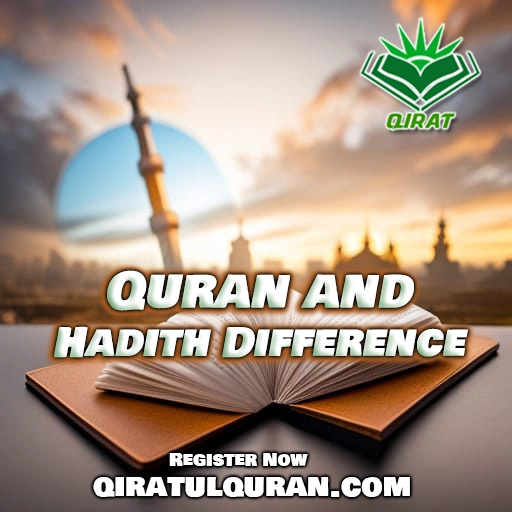Quran and Hadith difference: The Quran and Hadith are the two central texts in Islam that form the basis of Islamic beliefs, practices, and laws. While related in purpose, they differ considerably in nature, origin, and authority within Islam. Qiratul Quran will tell you the key differences between the Quran and Hadith. These are essential to properly interpreting Islamic scripture and practices.

The Nature and Origin of the Quran
The Quran is the foundational holy text of Islam, believed by Muslims to be the direct word of God as revealed to the Prophet Muhammad ﷺ between 610 and 632 CE. As the verbatim word of God, the text of the Quran is considered sacred, absolute, and immutable.
Muslims believe that the Quran was revealed by the angel Gabriel to the prophet Muhammad ﷺ over 23 years ago in fragments and verses. Muhammad ﷺ memorized the verses and repeated them verbatim to his Companions. The verses were also recorded on available writing materials during the Prophet’s life. Shortly after Prophet Muhammad ﷺ death, the first caliph, Abu Bakr, ordered the official compilation of the Quran to preserve the integrity of the divine revelations.
The Nature and Origin of the Hadith
Rather than the Quran, the Hadith is a record of the teachings, deeds, and sayings of the Prophet Muhammad ﷺ. There are numerous Hadith collections, compiled several generations after the death of the Prophet. Due to the temporal distance from Muhammad ﷺ life, the authenticity and reliability of hadith texts are carefully evaluated through scholarly critical analysis.
Hadiths were transmitted orally for over 200 years after the Prophet ﷺ death before being systematically compiled and recorded around the 9th century CE. While the Quran represents divine revelation, the Hadith reflects the interpretation and application of revelation by the Prophet himself. However, the human transmission of Hadith can allow for potential errors or falsified stories.
Quran: Direct Word of Allah versus Hadith: Indirect Inspired Teachings
The key distinction between the Quran and Hadith is the direct revelation of Allah’s words in the holy Quran versus the indirect and inspired words of the prophet Muhammad ﷺ recorded in the Hadith. For Muslims, by virtue of its direct divine authorship, the Quran is the incontrovertible word of God. As Islam’s sacred text, no part of the Quran can be altered or superseded.
In contrast, Hadiths are considered divinely inspired but originate from the Prophet ﷺ himself, not the direct speech of Allah. As such, Hadith does not have the same immutable sanctity as Quranic verses. Scholars can critique the reliability and authenticity of Hadith sources, recognizing human transmission can allow for error. This makes Hadith subordinate to the Quran in terms of authority within Islamic belief and law.
Does Hadith Has No Value Like the Quran?
Some anti-Islamic scholars and some illiterate secular people are saying that, But if any scholar says Hadith has no value it means He is against the Verses of the Quran. And if we can’t believe in Hadith how we believe in Quranic verses because these Quranic verses reveal on Prophet Muhammad ﷺ. Therefore, Belief in the Quran is totally related to Hadith but the difference is Quran is the verses of Allah & Hadith is the Tafseer of Quranic Law. As Quran Said:
مَّن يُطِعِ ٱلرَّسُولَ فَقَدْ أَطَاعَ ٱللَّهَ ۖ وَمَن تَوَلَّىٰ فَمَآ أَرْسَلْنَـٰكَ عَلَيْهِمْ حَفِيظًۭا
Whoever obeys the Messenger has truly obeyed Allah. But whoever turns away, then ˹know that˺ We have not sent you ˹O Prophet˺ as a keeper over them. (Al – Quran 4:80)
Quranic Verses Require Corroborating Hadiths
A distinctive feature of Quranic verses is their lack of context. Many verses in the Quran touch briefly on major subjects but provide little elaboration. This is where the Hadith complements the Quran by supplying explanatory context for the verses. Prophetic Hadith are used to provide background details, interpretation, and practical applications of Quranic principles.
For major Islamic rules and regulations derived from the Quran, there is a requirement for corroborating Hadiths to clarify context and meaning. However, the authority rests in the Quranic verse itself; the Hadith reinforces and expands based on the verse but cannot oppose or negate the Quranic principle. This further highlights the subordinate role of Hadith to Quranic authority.
Difference Between the Quran and Hadith Qudsi
Within the genre of Prophetic Hadith, there is a small subset referred to as Hadith Qudsi. These are sayings attributed to Muhammad ﷺ but unlike other Hadith, the wording and meaning are considered divinely revealed to the Prophetﷺ. The distinction of Hadith Qudsi is that the words themselves are not the direct speech of God, as with Quranic verses. Rather, the meaning was inspired to Muhammadﷺ by Allah but relayed to others in Muhammad’s own words.
For example, the famous Hadith Qudsi states, “Allah says: ‘I am just as My slave thinks I am, and I am with him when he remembers Me.'” Here the meaning was divinely revealed but the paraphrasing originates from Muhammadﷺ. This differentiates Hadith Qudsi from the verbatim word of Allah in the Quran while establishing a partial divine origin that separates it from standard Hadith.
Differences Between the Quran and Mushaf
In Arabic, the physical written compilation of Quranic verses is called a Mushaf. A Mushaf contains the divine revelations of the Quran in written form. While linguistically the same content as the Quran, there are some key distinctions between the Quran itself and a Mushaf compilation in book form:
- The Quran is the divine speech and sacred words memorized and transmitted orally. A Mushaf is a bound collection of those words physically recorded in writing.
- There is only one true Quran – the eternal divine revelation to Muhammadﷺ. There can be unlimited Mushafs containing the text of the Quran.
- The Quran is sacred in nature while a Mushaf is treated respectfully but not ascribed the same holy status.
- The Quran is authorized directly by Allah; a Mushaf must be verified as containing accurate Quranic content to be authoritative.
So in essence, the Quran is the eternal divine revelation and the Mushaf is a bound transcription of that revelation into book form for preservation and reading.
Difference in Authority of Quran Versus Hadith
Due to their different origins, when interpreting Islamic belief and practice, the Quran and Hadith do not share equal weight. Quranic verses hold supreme authority as the literal words of Allah. No other source in Islam can supersede, contradict, or alter the Quranic message.
Hadiths cannot carry the same level of authority as the divinely dictated words of God. Hadiths can clarify and expand on Quranic principles but cannot independently establish new core tenets of belief or law. If a Hadith contradicts the Quran, the Quranic position prevails.
The Quran and Hadith form an interconnected pair that jointly provides a framework for Islamic life. However, the critical distinction remains – Quranic revelation guides interpretation of Hadith but Hadith interpretation does not guide understanding of the Quran. This hierarchy contributes to the correct use of both texts within Islam.
Conclusion
While sharing a common goal of guiding Islamic faith and practice, the Quran and Hadith differ considerably in nature, origin, and authority. The Quran as a direct revelation from God occupies the supreme position in Islam. Hadiths offer inspired teachings but are subordinate sources that require alignment with Quranic principles. Understanding the key distinctions allows Muslims to properly apply both texts to their spiritual and daily lives.





